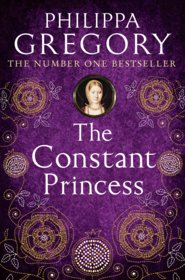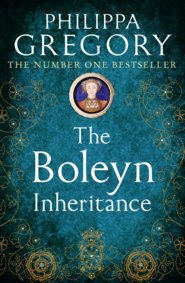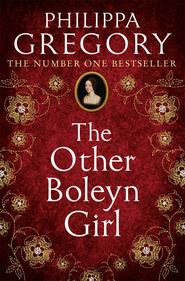По всем вопросам обращайтесь на: info@litportal.ru
(©) 2003-2025.
✖
Philippa Gregory 3-Book Tudor Collection 1: The Constant Princess, The Other Boleyn Girl, The Boleyn Inheritance
Настройки чтения
Размер шрифта
Высота строк
Поля
‘I daresay your father does not tell your mother every thought that crosses his mind,’ he said, trying to make her look at him again.
He succeeded. She gave him a long, slow, considering gaze from her blue eyes. ‘Perhaps he does not,’ she conceded. ‘I would not know. It is not fitting that I should know. But whether he tells her or not: my mother knows everything anyway.’
He laughed. Her dignity was quite delightful in a girl whose head barely came up to his chest. ‘She is a visionary, your mother? She has the gift of Sight?’
She did not laugh in reply. ‘She is wise,’ she said simply. ‘She is the wisest monarch in Europe.’
The king thought he would be foolish to bridle at a girl’s devotion to her mother, and it would be graceless to point out that her mother might have unified the kingdoms of Castile and Aragon but that she was still a long way from creating a peaceful and united Spain. The tactical skill of Isabella and Ferdinand had forged a single country from the Moorish kingdoms, they had yet to make everyone accept their peace. Catalina’s own journey to London had been disrupted by rebellions of Moors and Jews who could not bear the tyranny of the Spanish kings. He changed the subject. ‘Why don’t you show us a dance?’ he demanded, thinking that he would like to see her move. ‘Or is that not allowed in Spain either?’
‘Since I am an English princess I must learn your customs,’ she said. ‘Would an English princess get up in the middle of the night and dance for the king after he forced his way into her rooms?’
Henry laughed at her. ‘If she had any sense she would.’
She threw him a small, demure smile. ‘Then I will dance with my ladies,’ she decided, and rose from her seat at the high table and went down to the centre of the floor. She called one by name, Henry noted, Maria de Salinas, a pretty, dark-haired girl who came quickly to stand beside Catalina. Three other young women, pretending shyness but eager to show themselves off, came forwards.
Henry looked them over. He had asked Their Majesties of Spain that their daughter’s companions should all be pretty, and he was pleased to see that however blunt and ill-mannered they had found his request, they had acceded to it. The girls were all good-looking but none of them outshone the princess who stood, composed, and then raised her hands and clapped, to order the musicians to play.
He noticed at once that she moved like a sensual woman. The dance was a pavane, a slow ceremonial dance, and she moved with her hips swaying and her eyes heavy-lidded, a little smile on her face. She had been well-schooled, any princess would be taught how to dance in the courtly world where dancing, singing, music and poetry mattered more than anything else; but she danced like a woman who let the music move her, and Henry, who had some experience, believed that women who could be summoned by music were the ones who responded to the rhythms of lust.
He went from pleasure in watching her to a sense of rising irritation that this exquisite piece would be put in Arthur’s cold bed. He could not see his thoughtful, scholarly boy teasing and arousing the passion in this girl on the edge of womanhood. He imagined that Arthur would fumble about and perhaps hurt her, and she would grit her teeth and do her duty as a woman and a queen must, and then, like as not, she would die in childbirth; and the whole performance of finding a bride for Arthur would have to be undergone again, with no benefit for himself but only this irritated, frustrated arousal that she seemed to inspire in him. It was good that she was desirable, since she would be an ornament to his court; but it was a nuisance that she should be so very desirable to him.
Henry looked away from her dancing and comforted himself with the thought of her dowry which would bring him lasting benefit and come directly to him, unlike this bride who seemed bound to unsettle him and must go, however mismatched, to his son. As soon as they were married her treasurer would hand over the first payment of her dowry: in solid gold. A year later he would deliver the second part in gold and in her plate and jewels. Having fought his way to the throne on a shoestring and uncertain credit, Henry trusted the power of money more than anything in life; more even than his throne, for he knew he could buy a throne with money, and far more than women, for they are cheaply bought; and far, far more than the joy of a smile from a virgin princess who stopped her dance now, swept him a curtsey and came up smiling.
‘Do I please you?’ she demanded, flushed and a little breathless.
‘Well enough,’ he said, determined that she should never know how much. ‘But it’s late now and you should go back to your bed. We’ll ride with you a little way in the morning before we go ahead of you to London.’
She was surprised at the abruptness of his reply. Again, she glanced towards Arthur as if he might contradict his father’s plans; perhaps stay with her for the remainder of the journey, since his father had bragged of their informality. But the boy said nothing. ‘As you wish, Your Grace,’ she said politely.
The king nodded and rose to his feet. The court billowed into deep curtseys and bows as he stalked past them, out of the room. ‘Not so informal, at all,’ Catalina thought as she watched the King of England stride through his court, his head high. ‘He may boast of being a soldier with the manners of the camp, but he insists on obedience and on the show of deference. As indeed, he should,’ added Isabella’s daughter to herself.
Arthur followed behind his father with a quick ‘Goodnight’ to the princess as he left. In a moment all the men in their train had gone too, and the princess was alone but for her ladies.
‘What an extraordinary man,’ she remarked to her favourite, Maria de Salinas.
‘He liked you,’ the young woman said. ‘He watched you very closely, he liked you.’
‘And why should he not?’ she asked with the instinctive arrogance of a girl born to the greatest kingdom in Europe. ‘And even if he did not, it is all already agreed, and there can be no change. It has been agreed for almost all my life.’
He is not what I expected, this king who fought his way to the throne and picked up his crown from the mud of a battlefield. I expected him to be more like a champion, like a great soldier, perhaps like my father. Instead he has the look of a merchant, a man who puzzles over profit indoors, not a man who won his kingdom and his wife at the point of a sword.
I suppose I hoped for a man like Don Hernando, a hero that I could look up to, a man I would be proud to call father. But this king is lean and pale like a clerk, not a knight from the romances at all.
I expected his court to be more grand, I expected a great procession and a formal meeting with long introductions and elegant speeches, as we would have done it in the Alhambra. But he is abrupt; in my view he is rude. I shall have to become accustomed to these northern ways, this scramble to do things, this brusque ordering. I cannot expect things to be done well or even correctly. I shall have to overlook a lot until I am queen and can change things.
But, anyway, it hardly matters whether I like the king or he likes me. He has engaged in this treaty with my father and I am betrothed to his son. It hardly matters what I think of him, or what he thinks of me. It is not as if we will have to deal much together. I shall live and rule Wales and he will live and rule England, and when he dies it will be my husband on his throne and my son will be the next Prince of Wales, and I shall be queen.
As for my husband-to-be – oh! – he has made a very different first impression. He is so handsome! I did not expect him to be so handsome! He is so fair and slight, he is like a page boy from one of the old romances. I can imagine him waking all night in a vigil, or singing up to a castle window. He has pale, almost silvery skin, he has fine golden hair, and yet he is taller than me and lean and strong like a boy on the edge of manhood.
He has a rare smile, one that comes reluctantly and then shines. And he is kind. That is a great thing in a husband. He was kind when he took the glass of wine from me, he saw that I was trembling, and he tried to reassure me.
I wonder what he thinks of me? I do so wonder what he thinks of me?
Just as the king had ruled, he and Arthur went swiftly back to Windsor the next morning and Catalina’s train, with her litter carried by mules, with her trousseau in great travelling chests, her ladies-in-waiting, her Spanish household, and the guards for her dowry treasure, laboured up the muddy roads to London at a far slower pace.
She did not see the prince again until their wedding day, but when she arrived in the village of Kingston-upon-Thames her train halted in order to meet the greatest man in the kingdom, the young Edward Stafford, Duke of Buckingham, and Henry, Duke of York, the king’s second son, who were appointed to accompany her to Lambeth Palace.
‘I’ll come out,’ Catalina said hastily, emerging from her litter and walking quickly past the waiting horses, not wanting another quarrel with her strict duenna about young ladies meeting young men before their wedding day. ‘Dona Elvira, say nothing. The boy is a child of ten years old. It doesn’t matter. Not even my mother would think that it matters.’
‘At least wear your veil!’ the woman implored. ‘The Duke of Buck…Buck…whatever his name, is here too. Wear your veil when you go before him, for your own reputation, Infanta.’
‘Buckingham,’ Catalina corrected her. ‘The Duke of Buckingham. And call me Princess of Wales. And you know I cannot wear my veil because he will have been commanded to report to the king. You know what my mother said: that he is the king’s mother’s ward, restored to his family fortunes, and must be shown the greatest respect.’
The older woman shook her head, but Catalina marched out bare-faced, feeling both fearful and reckless at her own daring, and saw the duke’s men drawn up in array on the road and before them, a young boy: helmet off, bright head shining in the sunshine.
Her first thought was that he was utterly unlike his brother. While Arthur was fair-haired and slight and serious-looking, with a pale complexion and warm brown eyes, this was a sunny boy who looked as if he had never had a serious thought in his head. He did not take after his lean-faced father, he had the look of a boy for whom life came easily. His hair was red-gold, his face round and still baby-plump, his smile when he first saw her was genuinely friendly and bright, and his blue eyes shone as if he was accustomed to seeing a very pleasing world.
‘Sister!’ he said warmly, jumped down from his horse with a clatter of armour, and swept her a low bow.
‘Brother Henry,’ she said, curtseying back to him to precisely the right height, considering that he was only a second son of England, and she was an Infanta of Spain.
‘I am so pleased to see you,’ he said quickly, his Latin rapid, his English accent strong. ‘I was so hoping that His Majesty would let me come to meet you before I had to take you into London on your wedding day. I thought it would be so awkward to go marching down the aisle with you, and hand you over to Arthur, if we hadn’t even spoken. And call me Harry. Everyone calls me Harry.’
‘I too am pleased to meet you, Brother Harry,’ Catalina said politely, rather taken-aback at his enthusiasm.
‘Pleased! You should be dancing with joy!’ he exclaimed buoyantly. ‘Because Father said that I could bring you the horse which was to be one of your wedding-day presents and so we can ride together to Lambeth. Arthur said you should wait for your wedding day, but I said, why should she wait? She won’t be able to ride on her wedding day. She’ll be too busy getting married. But if I take it to her now we can ride at once.’
‘That was kind of you.’
‘Oh, I never take any notice of Arthur,’ Harry said cheerfully.
Catalina had to choke down a giggle. ‘You don’t?’
He made a face and shook his head. ‘Serious,’ he said. ‘You’ll be amazed how serious. And scholarly, of course, but not gifted. Everyone says I am very gifted, languages mostly, but music also. We can speak French together if you wish, I am extraordinarily fluent for my age. I am considered a pretty fair musician. And of course I am a sportsman. Do you hunt?’
‘No,’ Catalina said, a little overwhelmed. ‘At least, I only follow the hunt when we go after boar or wolves.’
‘Wolves? I should so like to hunt wolves. D’you really have bears?’
‘Yes, in the hills.’
‘I should so like to hunt a bear. Do you hunt wolves on foot like boar?’
‘No, on horseback,’ she said. ‘They’re very fast, you have to take very fast dogs to pull them down. It’s a horrid hunt.’
‘I shouldn’t mind that,’ he said. ‘I don’t mind anything like that. Everyone says I am terribly brave about things like that.’
‘I am sure they do,’ she said, smiling.












